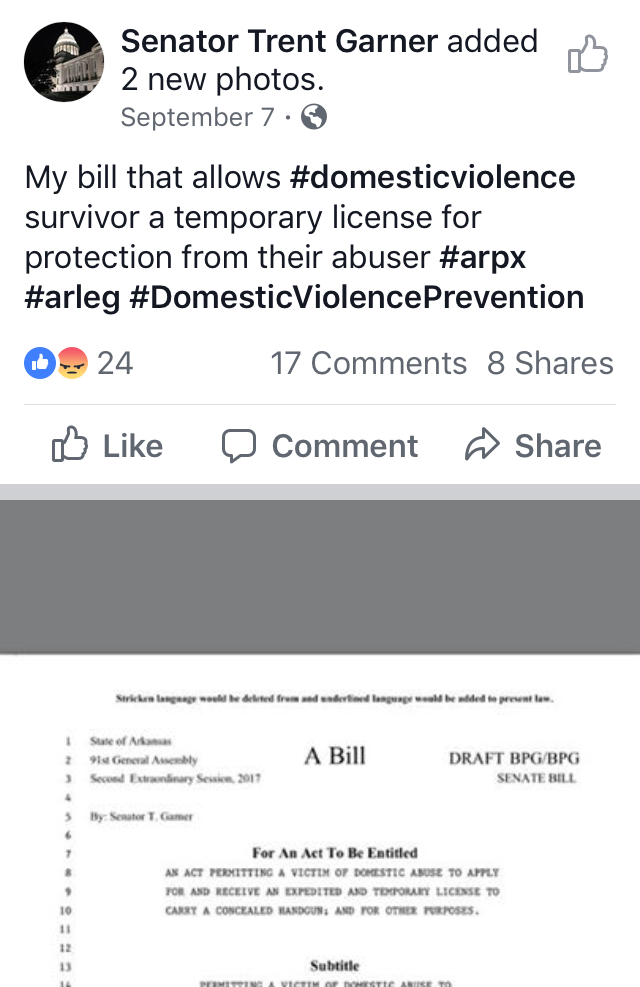Good intent but a bad gun bill – Support Act 746 instead!
Good intent but a bad handgun bill – Support Act 746 instead!
By David Ferguson
Today, I look at a handgun bill being proposed by Senator Trent Garner, but my primary focus is on the need to protect constitutional carry under Act 746 of 2013 and on why there is an urgent need for Attorney General Leslie Rutledge correct an error in her opinion on Act 746. The Attorney General erroneously assumed the existence of a concealed handgun law meant the law prohibited you from carrying a concealed handgun without a license. A review of that law shows no such prohibition. The fact that Senator Garner drafted legislation in an attempt to help domestic abuse victims obtain a temporary concealed handgun license is proof that crime victims are endangered by the cloud put over Act 746 by the AG opinion.
Parts of this article are lengthy, but that is by necessity. Handgun owners need to have all the facts if they are going to help protect the rights of Arkansans to constitutional carry.
PART I. SENATOR GARNER’S BILL
 Senator Trent Garner wants to help victims of domestic abuse to protect themselves. Under his legislation, when a victim of domestic abuse requests an order of protection, the victim could also ask the judge for a temporary concealed carry permit for a handgun.
Senator Trent Garner wants to help victims of domestic abuse to protect themselves. Under his legislation, when a victim of domestic abuse requests an order of protection, the victim could also ask the judge for a temporary concealed carry permit for a handgun.
While Garner’s intent may be good, the bill works against Second Amendment rights in Arkansas, not only the rights of domestic abuse victims but of all Arkansans. Senator Garner can still be instrumental in helping domestic abuse victims protect themselves but his bill does not fit in Arkansas.
 Other states have considered similar legislation. Why? Because under their laws a person may have to wait a significant time before being allowed to carry a handgun. Consider Carol Bowne, 39, of New Jersey who had a protective order against a former boyfriend. To protect herself, she applied for a New Jersey license to carry a handgun. Months passed, and while she was still waiting for a permit, her former boyfriend stabbed her to death.[i]
Other states have considered similar legislation. Why? Because under their laws a person may have to wait a significant time before being allowed to carry a handgun. Consider Carol Bowne, 39, of New Jersey who had a protective order against a former boyfriend. To protect herself, she applied for a New Jersey license to carry a handgun. Months passed, and while she was still waiting for a permit, her former boyfriend stabbed her to death.[i]
Protecting domestic abuse victims is a praiseworthy goal. However, Senator Garner made a mistake I have seen other freshman legislators make in the past. He saw legislation from other states and assumed the same legislation would fit in Arkansas. It doesn’t.
Arkansas protects our right to bear arms better than the states were the legislation has been considered. In those states the legislation was filed to chip away at their state’s restrictions on the right to bear arms -such as waiting periods and the need for a gun permit.
Under Garner’s legislation, a domestic abuse victim who applies for a protective order could also apply for a temporary (forty-five day) concealed carry permit and, if granted, the victim must pay the license fee. It would only be a temporary measure and at the end of the forty-five day period the domestic abuse victim is expected to get a regular license by paying for a training course, paying the license fee and complete other requirements need for the regular license.
Under Act 746 of 2013 you can no longer be penalized for carrying a handgun UNLESS you are carrying it with the INTENT of employing it UNLAWFULLY against a person. Today in Arkansas, a domestic abuse victim can purchase a gun and carry it out of the store without needing permissions or paying fees. Gun control advocates think Act 746 only means you can “open carry” but as I will show, that view is not supported by the law.
- Unfortunately, Senator Garner’s bill would likely make some domestic abuse victims think they must go through the court, jump through hoops, and pay fees in order have a gun to protect themselves.
- The bill would add confusion in light of freedoms protected by Act 746.
- In addition, if a restrictive bill like this one is passed, it may be used by gun control advocates as an augment to limit Act 746.
PART II. A BETTER COURSE FOR SENATOR GARNER
I would encourage Senator Garner to drop his well-meaning but confusing legislation and instead support Act 746 by encouraging Attorney General Rutledge to reconsider the issue of carrying a handgun without a license. As I will discuss later, it is evident the Attorney General’s opinion which says you must have a license is based on a false assumption and not supported by the law.
If the Attorney General fails to correct the opinion, then Senator Garner should support the efforts of Senator Terry Rice, Senator Linda Collins-Smith, and Representative Marcus Richmond. Senator Rice sponsored and Senator Collins-Smith and Representative Richmond cosponsored Senate Bill 585 of 2017 which would have cleared up confusion created by the Attorney General’s erroneous opinion that you must have a license to carry a concealed handgun. Senator Garner is well aware of their legislation because he is one of the eight members of the Senate Judiciary Committee …. where the bill was assigned but failed to get approval.
Here is what SB585 said and this is what the Attorney General should have said from the beginning concerning the concealed handgun law:
Unlicensed carry not prohibited.
This subchapter does not prohibit a person from carrying a handgun without a license to carry a concealed handgun under this subchapter, whether openly or concealed, if he or she is not otherwise prohibited by the laws of this state from possessing a firearm in the state as permitted by the United States Constitution.
The ability of citizens to carry a concealed handgun is not some strange notion. The right to carry a concealed handgun without a license is even protected in Bernie Sanders home state of Vermont!
PART III. WHY THE ATTORNEY GENERAL WAS WRONG ABOUT ACT 746 AND CONCEALED CARRY
Basic facts:
- Prior to Act 746 of 2013, if you carried a handgun for self-defense you could be potentially charged with the offense of Carrying a Weapon since the law prohibited carrying a weapon for the purpose of using it against another person. (That pretty much is the reason for carrying for self-defense.) The law was passed in 1975 as part of the lengthy Arkansas Criminal Code, and has been amended several times. Here is how the offense of Carrying a Weapon, Arkansas Code 5-73-120 (a), read prior to 2013: “A person commits the offense of carrying a weapon if he or she possesses a handgun, knife, or club on or about his or her person, in a vehicle occupied by him or her, or otherwise readily available for use with a purpose to employ the handgun, knife, or club as a weapon against a person.” (emphasis added) The law went on to provide some exemptions to the prohibition.
- In 1995, the legislature passed the concealed handgun law. Arkansans who wanted to carry a handgun for self-defense found this law as a way to carry a handgun without worrying about being charged with the offense of Carrying a Weapon. The concealed handgun law as it reads now is included at the bottom of this article.
- Act 746 of 2013 substantially changed the offense of Carrying a Weapon with the goal of protecting your Second Amendment rights. Under Act 746 you are not guilty of the offense unless the prosecutor proves you were carrying a handgun for the purpose of UNLAWFULLY using it against another person. No longer do you risk being an offender by carrying a handgun for self-defense. Here is how the law now reads: “A person commits the offense of carrying a weapon if he or she possesses a handgun, knife, or club on or about his or her person, in a vehicle occupied by him or her, or otherwise readily available for use with a purpose to attempt to unlawfully employ the handgun, knife, or club as a weapon against a person.”
- Attorney General Leslie Rutledge was asked to give an opinion on the effect of Act 746. One of the issues addressed was whether changes made by Act 746 meant you could carry a concealed handgun without a license, since the offense of Carrying a Weapon only applies if you are carrying the handgun for the purpose of UNLAWFULLY using it against another person.
- In Attorney General Opinion 2015-064, the Attorney General said: “A person may not lawfully carry a concealed handgun in public without a properly issued concealed-carry license. I believe this necessarily follows from the concealed-carry licensing scheme that predates Act 746 and that, in my opinion, was unaffected by Act 746.”
- Attorney General Rutledge has a reputation for thorough research but an incorrect assumption led to a significant error here. Errors happen and even the courts have a procedure to rehear and issue and correct errors.
- The Attorney General based the opinion on the mere existence of a concealed handgun license and then made the incorrect assumption that it must prohibit something.
- An examination of the concealed handgun law clearly shows the opinion is wrong. There is nothing in the concealed handgun law to prohibit a person from carrying a concealed handgun without a license. People applied for a license not because of any restriction in the concealed handgun law. People applied for a license to avoid being charged with Carrying a Weapon, as it read prior to 2013.
- Representative John Payton requested an Attorney General’s Opinion on some related issues under Act 746, but in early 2016, the Attorney General declined to answer questions saying the issues were subject to litigation and the policy of the Attorney General’s Office is not to respond when an issue is subject to litigation.
- In 2017 the legislature added to the concealed handgun law another class of license referred to as “enhanced carry.” The enhanced carry law is a restrictive law requiring permission to carry a concealed handgun in certain areas that would otherwise be considered a gun free zone. Although enhanced carry is in the same subchapter of law, its restrictions have nothing to do with the regular concealed handgun law being discussed here.
Why the Attorney General was wrong about the concealed handgun law:
- The concealed handgun law uses the word “license” and grants exceptions from the license but the “license” never represents itself as being exclusive. To assume that it is ignores the history of the law and to ignore the actual text of the concealed carry law.
- The concealed carry law does not state any prohibition against carrying a concealed handgun without a license.
- The concealed carry law has no penalty for carrying a concealed handgun without a license. Other than in the enhanced carry license (which is not relevant here), the only penalty in the concealed handgun law is for giving false information on an application for a license.
- A closer analysis of the key words: “penalty” “permit,” “possess,” “prohibit,” and “violation,” and derivatives of these words in the concealed handgun law does not reveal any instance where the words are used to restrict non-license holders.
- A reading of the concealed handgun law does not provide any support for the notion that it is a restriction on your right to bear arms. Instead, the history of the concealed handgun law and the lack of any prohibitions in the concealed handgun law verifies that the law was not passed as a restriction but as a protection against the offense of Carrying a Weapon, as the offense read in 1995. The concealed handgun law provided a way to carry for self-defense without being charged with Carrying a Weapon. The restriction on rights was in the offense of Carrying a Weapon, so there was no reason for the concealed handgun law to include a prohibition on carrying a concealed handgun without a license. What kept a person from carrying without a license was the offense of Carrying a Weapon, as it used to read.
- The offense of Carrying a Weapon as changed by Act 746 is now self-defense friendly. There is no longer a fear that carrying a handgun (open or concealed) for self-defense might subject you to a violation of the offense of Carrying a Weapon.
- Because the offense of Carrying a Weapon is now self-defense friendly, the stick to get you to apply for a concealed handgun license is gone.
Would that make the concealed handgun license obsolete? No. The concealed handgun license still has a purpose even without being the only way to carry a concealed handgun.
- Act 746 applies only in Arkansas, but with a concealed carry license you can use the license to carry concealed in many states having reciprocity with Arkansas.
- You must have a concealed carry license to apply for an enhanced concealed carry license, which is used to carry a concealed handgun in certain gun-free zones. (BY THE WAY: The many restrictions and requirements of the enhanced carry law appear to have been written to make sure only a few people would ever apply for the enhanced license.)
- During a traffic stop, the license is a handy (but not necessary) way to inform a law enforcement officer you have a handgun.
- Arkansas law allows you to use the license for identification in some circumstances, such as for voter registration.
- Some people may still want a license as a way to show they have had at least minimal training with a handgun.
PART IV – ATTORNEY GENERAL CAN CORRECT THE ERROR AND PROTECT DOMESTIC ABUSE VICTIMS
Attorney General Opinion 2015-064 put a cloud over the rights of domestic abuse victims and others. It appears the issue of carrying a concealed handgun without a license has not been reconsidered because there is some litigation in this area and it is the office policy not to issue opinions on something that is subject to litigation.
The policy is generally a good one, but it is just a policy. This situation clearly warrants an exception. First, this portion of the AG opinion is based on a mere assumption and not facts. Second, the AG opinion put a cloud over the exercise of gun rights, and this cloud jeopardizes the safety of the victims of domestic abuse who may think they cannot protect themselves without going to the time, energy, and expense of getting a concealed handgun license.
The safety of domestic abuse victims and the safety of other Arkansans is too important to stick to a mere office policy. The Attorney General should revisit the issue immediately.
If maintaining the office policy such a big deal, then perhaps there is still a way around the policy. Representative John Payton passed Act 486 of 2017 to keep a person from being denied the right to obtain a concealed handgun license for exercising their rights outside of the concealed handgun law. It is unlikely his law is the subject of any litigation and therefore could be used a vehicle to correct the record on carrying a handgun without a license. The Attorney General could revisit the issue of carrying a concealed handgun without a license by addressing whether Act 486 keeps you from being denied a license for having exercised your constitutional rights carrying a handgun (open, concealed, or both). And, then addressing the essential question of whether there is any prohibition against carrying a concealed handgun without a license. Based on Act 746 and the lack of any restriction in the concealed carry law, the answer should be – there is no restriction.
* * * * * * * * * *
Thank Senator Garner for his desire to help domestic abuse victims, but encourage him to redirect his efforts in a positive way by supporting domestic abuse victims through constitutional carry under Act 746 of 2013.
Protect Act 746 and you protect the rights of domestic abuse victims.
 David Ferguson is a former Director of Arkansas’ Bureau of Legislative Research, having a thirty-two-year career as an attorney for the Arkansas legislature. After retirement from state service his primary focus has been beef cattle farming. He is also a former officer of Conduit for Action.
David Ferguson is a former Director of Arkansas’ Bureau of Legislative Research, having a thirty-two-year career as an attorney for the Arkansas legislature. After retirement from state service his primary focus has been beef cattle farming. He is also a former officer of Conduit for Action.
[i] http://www.guns.com/2015/06/08/nj-woman-stabbed-to-death-by-ex-while-waiting-months-for-gun-permit/
Concealed handgun law




